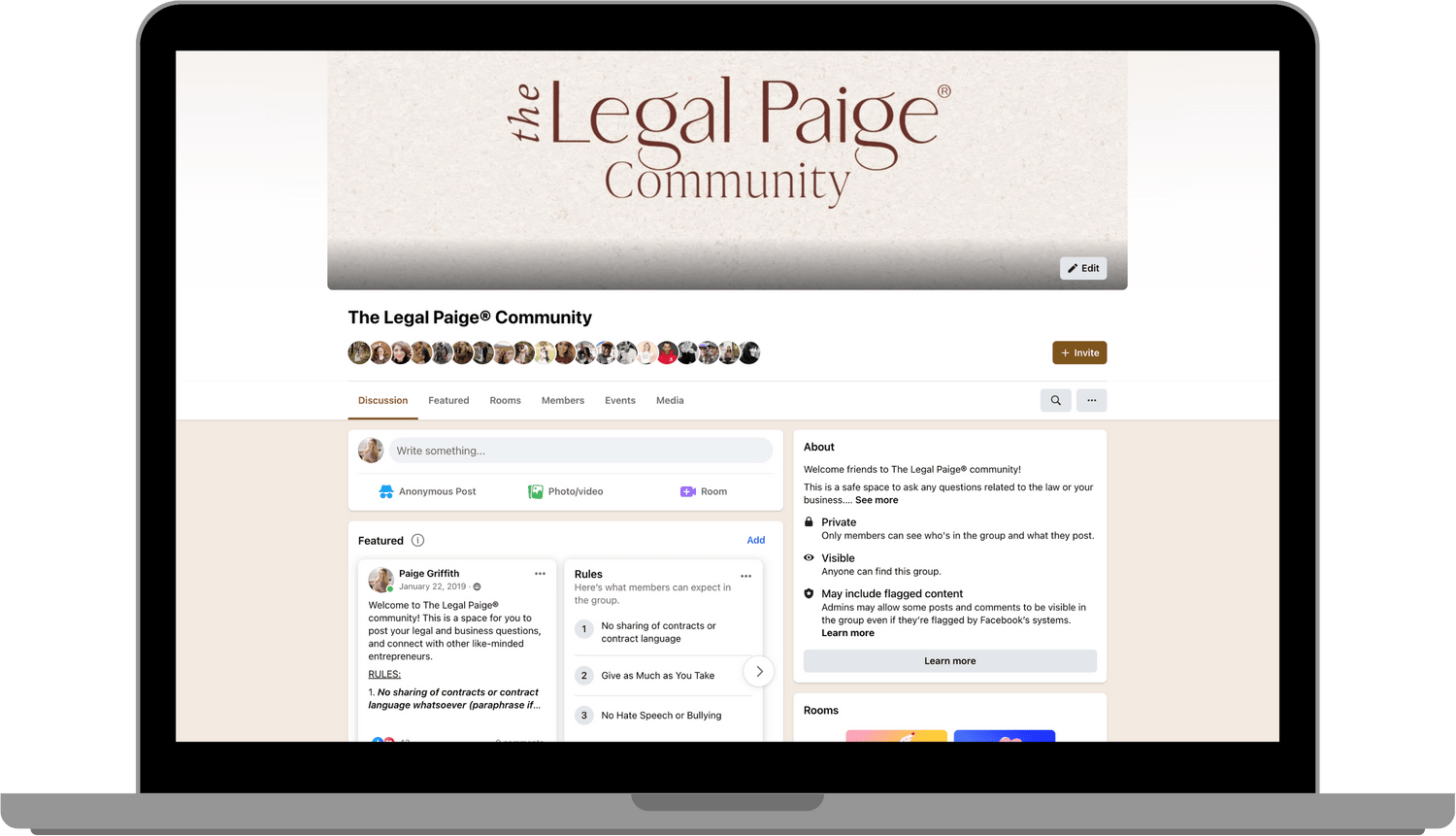
The Top Four Clauses to Protect Yourself As a Speaker + Educator
If you love helping others, speaking at conferences, and education is part of your big picture business plan, then you NEED to ensure you and your business are fully protected when you’re speaking and teaching. Often event organizers won’t provide you with a contract for your speaking engagement (or it's a one-sided contract and doesn’t protect YOU). This is why it's important to think about what you should do to proactively protect yourself… and that includes knowing what to include in your contract when you’re participating in events like this. Being an educator is an incredible opportunity and can definitely help you scale your business, but you need to make sure your legal booty is covered!
Below are the three clauses you MUST have to protect yourself as a speaker or educator.
01 | Compensation Clause
When it comes to compensation, you as the speaker sometimes have options over as to how you want to receive your compensation for an event. One option is to receive a monetary fee with a retainer to reserve your services. This option explains that you are paid a portion of your fee upfront as a way for the event organizer to commit to your services and allow for them to pay the remaining portion of the fee at a later date. A second option is to receive a non-monetary fee, such as travel compensation and free tickets to the event, that you can use for other members of your team or if you want to attend other sessions.
Whatever route you choose, it is crucial to include a clause detailing what your compensation will be (and usually this goes right at the top of your speaker contract!). Be as specific as possible, include what payment you will receive, the amount you are to be paid, how you will receive it, any dates on which payment is to be made, and any other specifics about how payment will be received. Include any information about what ramifications there are for late or non-payments, reasonable late periods should the payment be due on a weekend or holiday, or any other specifics about the payment that you think could come up. The more specifics you lay out in your clause, the more protections and mutual understanding you create for both parties.
02 | Intellectual Property Clause
At most speaking and educational events, you’ll be encouraged to post a lot on social media, so you’re going to want to be protected if people are taking photos of you, your presentation materials, your work product, or, say, if they record video of you speaking.
Consider drafting and establishing a clause in your contract that states all of your slides, outlines, work product, etc. are protected and copyrighted by you. A quick refresher on copyright: copyright establishes protection for original works of authorship, and protection exists the moment that you create the work and fix it in a tangible form that can be seen either directly or with the aid of a machine or device, like a computer.
(For all the details, check out our previous blog post, How to Register your Copyrighted Material with the US Copyright Office)
While you’re not required to copyright your work to receive protections for it, it can offer more opportunities and the ability to potentially bring a legal suit if needed. However, if you decide that you don’t want to go through that process, having a clause in your contract with language that states all of your slides, displays, and other work product is exclusively YOURS and yours alone, will help provide an extra layer of protection for your work. This clause could also include provisions requiring your name or logo to be on all images or slides used, informing attendees that they need to tag your social media if they post slides or handouts, etc.
03 | Promotion Duties Clause
If you’re speaking or educating at an event you need to ensure that your duties and the duties of those running the event are specifically spelled out and clarified in your contract. This is especially true if you’re doing an event for exposure because you need to make sure you’re receiving that exposure.
For a promotion duties clause, you need to lay out what the duties of you as the speaker are to promote the event, and what are the duties of the company to promote YOU. This clause outlines exactly what both you and the event are responsible for. Things to write into in this clause include who is responsible for promoting the event, how that promotion will take place (Facebook posts, Instagram stories, etc.), and the timeline for promotional duties. Outline what both you and the company are responsible for in explicit language so that you can avoid any ambiguity or misunderstanding that can result in later issues.
And don’t think we forgot about you, Course Creators! You’re educators, too and we have just the template for you. And just because we love our TLP Family so much, here’s a bonus MUST HAVE clause for course creators.
04| Communication Clause
One last clause to consider including in your contract is communication which will lay out all of the obligations and protections surrounding communications with yourself and the company, as well as communications between yourself and, if you’re in an online course, those participants who take the course. If you have a private Facebook community for the event, then all communication needs to stay there and only there. No DMs, no emails, etc. Keep the communications specifically where they are supposed to stay and don’t delineate from that plan.
When it comes to communicating with the event company directly, specify in your contract how communication is to primarily take place between the two of you, such as a thorough email, and if an alternative method of communication needs to be used, what that method is and when that would need to be used. Also establish timeframes for communication, when replies can and should be expected by both parties, and whether or not either of you can be reached on weekends or holidays.
When you decide to become a speaker or educator you are opening the door to the public eye and more potential liability. It’s essential that you have a contract in place to protect you and your business!
Purchase the Speaker + Educator Contract here:
THIS BLOG POST IS NOT A SUBSTITUTE FOR LEGAL ADVICE. EVERY SITUATION IS DIFFERENT & IS FACT-SPECIFIC. A proper legal analysis is necessary based on your location and contract. Consult an attorney in your home state for advice regarding your contract or specific legal situation.

Join the Community
Be a part of 8000+ TLP Community Members in this safe space and get real-time answers from Paige and her legal team daily!


Leave a comment